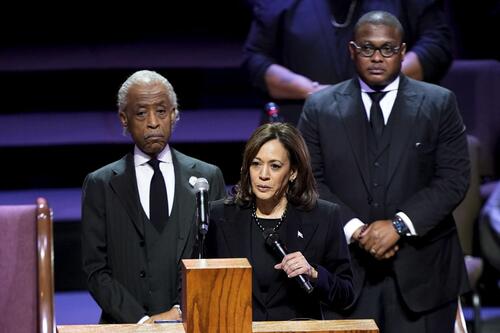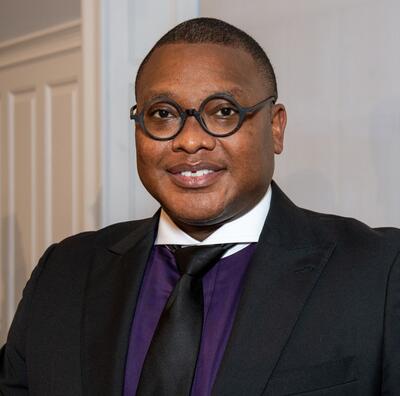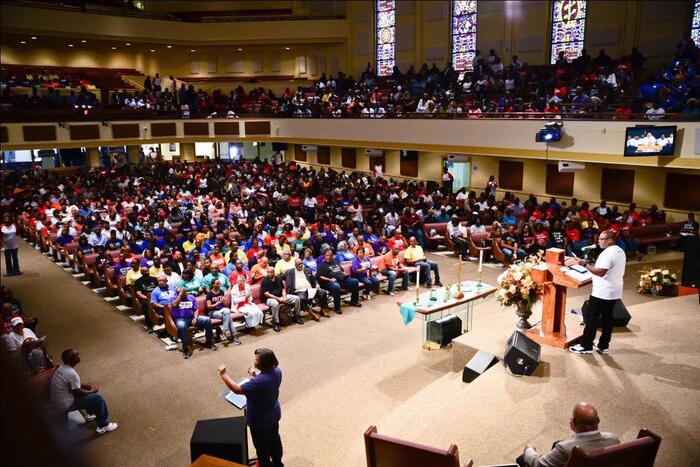By Ray Waddle
When the world witnessed the televised funeral for Tyre Nichols, it saw a leading Memphis church in action as host, with Senior Pastor J. Lawrence Turner ’06 M.Div. offering prayers to meet the latest grievous national moment.
The sacred stage was no surprise—4,000-member Mississippi Boulevard Christian Church is one of the most respected congregations in town. In Jason Turner’s 10 years as minister there, the Boulevard’s work has become only more urgent as a force for a more humane America.
 “I always wanted this to be a catalytic congregation—to hold public officials accountable, to create programming to serve our church and the world beyond it,” Turner, the current YDS Alumni Board president, said in a recent interview.
“I always wanted this to be a catalytic congregation—to hold public officials accountable, to create programming to serve our church and the world beyond it,” Turner, the current YDS Alumni Board president, said in a recent interview.
“This church in this city comes with great responsibility, not just to demonstrate pastoral acumen and business savvy but to pursue a vision of community care. Knowing its potential, I felt God led me to leverage the influence of this congregation for the benefit of many others.”
Turner’s own social gospel coordinates make all this possible—his meetings with law enforcement to address brutal police practices, his plans to enhance local healthcare options, his efforts to ensure the faith’s relevance in a “post-everything” world still dominated by recalcitrant white ideologies.
“Whether consciously or subconsciously, people have a real desire for community. The single young professional who works in tech, the resident in senior housing who can’t get out much—everybody needs community. That’s a unique gift churches can offer in the post-everything era: a church is a place that walks with people through the joyous or difficult aspects of their lives.”
This is a time, he said, for people of faith to reclaim a moral voice in public spheres where they have a legacy of good work—healthcare access, for instance. Turner is positioning Mississippi Boulevard church to become a leading advocate of health and wholeness. In pandemic times, the church has vaccinated 5,000 people and tested thousands more. During the shutdown, the Boulevard used the money it saved on utilities to feed more people, dropping off hot meals to seniors and putting together sack lunches to offer to shelterless people downtown.
The church also partners with the innovative Memphis organization Church Health, which offers affordable healthcare and is managed by physician/founder Scott Morris ’79 M.Div.
“It’s no mystery that so many hospitals have names associated with church—here, there’s Methodist Le Bonheur Healthcare, St. Francis Hospital, St. Jude Children’s Hospital, Baptist Memorial Hospital,” Turner said. “In that spirit we want to be an advocate not just in a state like Tennessee that refuses to expand Medicaid and give people access to healthcare but speak also to how people can become healthy and whole in this day and time. It’s about mental health, emotional health, understanding how one’s overall environment contributes to personal wellbeing. Our concern goes not just to our congregation but to creation and the wider community. There’s reclamation to be done.”
A congregational strategic plan includes construction of housing for local healthcare students by renovating 23 acres of church property in the city’s Medical District. Turner and other local leaders would like to see Nashville-based Meharry Medical School open a Memphis branch in order to train more Black doctors locally.
“Memphis is ground zero for a lot of health concerns—diabetes, hypertension, heart disease, renal failure, and liver transplants in a city that’s 65 percent African American,” Turner said. “There are not enough African American doctors here. We can turn around healthcare outcomes if we can increase the number of African American physicians.”
Turner is working on another front—he’s a leader in the new Black Clergy Collaborative, a group of Tennessee ministers focused on promoting public policies that protect voting rights, food and housing justice, policing reforms, and affordable loans.
One reason for starting the Black Clergy Collaborative last year was to respond to persistent white Christian lethargy, indifference, or resistance to the hope of removing perennial obstacles to Black progress in America.
“I’ve tried to work with white evangelical pastors and also with pastors at liberal white churches, and there always seems to be a point where they say, ‘I’m not ready to go that far,’” he said. “And I’m not talking about radical stuff! A recent example was to ask ministers to stand with me to make sure voting precincts stayed open as long as they were supposed to. I couldn’t get either side to take a stand. Ultimately, when you have the benefit of white privilege and you know a political issue doesn’t impact you, you find reasons not to speak out. This pattern has to be acknowledged across this country, with its many thousands of churches. But I’m hoping we can get to the point of finding solidarity with each other on what I see as a moral vision that Jesus Christ models for us in the Gospels.”
 Jason Turner grew up in Nashville, the son of prominent local minister James Turner Sr. and Donzetta Turner. The elder Turner was pastor for 40 years at New Hope Baptist Church and served as chaplain of the county sheriff’s office, ministering to men awaiting trial and helping them reenter society. Jason is one of three sons—all three became ministers. His brother James Turner II is now pastor of New Hope.
Jason Turner grew up in Nashville, the son of prominent local minister James Turner Sr. and Donzetta Turner. The elder Turner was pastor for 40 years at New Hope Baptist Church and served as chaplain of the county sheriff’s office, ministering to men awaiting trial and helping them reenter society. Jason is one of three sons—all three became ministers. His brother James Turner II is now pastor of New Hope.
Jason graduated from Fisk University in Nashville and went on to YDS, where he was awarded the H.H. Tweedy Prize for exceptional promise for pastoral leadership and served as student president. After graduation, he was minister at Community Baptist Church in New Haven for seven years. He also chaired the Board of Commissioners of the Housing Authority of New Haven. A crucial association during his Connecticut years was his experience with the Rev. Al Sharpton—Turner served on the board of the National Action Network, a leading civil rights organization founded by Sharpton. The Rev. Sharpton gave the eulogy at the Nichols funeral at Mississippi Boulevard church, praising Jason Turner as a young giant in the labor of social justice and prophetic ministry.
When Turner returned to Tennessee in 2013 to lead the Boulevard, he wanted to leverage the church’s strong local standing and deepen its impact.
His work across the state to advocate for more progressive public policies, including gun safety measures, is an enduring example—despite the stymieing political reality of a conservative “supermajority” in the Tennessee legislature.
“It’s going to take some face-to-face meetings, building relationships with people, because our politics here and nationally are so divisive and full of anger. When I meet legislators one-on-one, I do find a real person—they’re very respectful in those interactions. But once it’s over, they retreat back to the ideology. I don’t know if there’s a moral appeal that can be made—that’s where we are in this country. But there are no permanent friends, no permanent enemies: I know lawmakers who are willing to say, ‘Well, I don’t agree with you on everything, but I can work with you on this issue.’ I think that’s our approach at this point: OK, they’re not going to take our entire agenda, but on some things we can see eye to eye.”
What gives Turner hope and resilience is the moral clarity of Jesus’ command to love God with all our hearts and to love our neighbor as ourselves.
“To me, that ought to be the core that Christians act out of: I will not only love God but express that love of God by wanting for my neighbor what I want for myself. When we get to that core, that should inform everything from poverty and the opioid crisis to reducing gun violence and officer-involved shootings. It means healthcare is a fundamental human right. We’ve lost sight of this gospel foundation. Churches have gone astray in politics because they’ve lost it. Many churches settle for doing some charity, giving people a plate of food or some clothes that don’t fit anymore or doing a dental clinic once a year. What Jesus asks is more than that.”
A sense of history helps, too, he said, the recognition that progress comes painfully slowly but does come.
“If we’re students of history, we see that the major periods of change weren’t made in a moment,” he said. “There might have been a moment that got them over the goal line, but it often took a three-to-five-year push. If you look at Martin Luther King’s movement, it took 10 years to get from the bus boycott in Montgomery (1955) to the Voting Rights Act (1965). There were lots of deaths, violence, and bombings, but also headway. It’s the long march to freedom. We’ve got to maintain faith and hope that the destination is still something we can reach. Hatred will only keep driving us to more violence. That’s why it takes the grace of God. We’re all flawed, broken people, prone to make errors and mistakes. We ask God’s grace for the capacity to love beyond the categories we find familiar and comfortable.”
